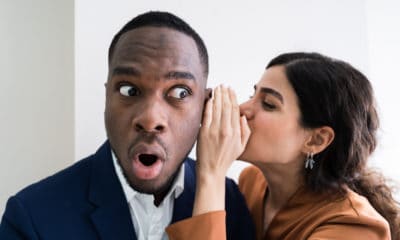10 Body Language Cues for Better Communication
Whether you realize it or not, your body language has a major influence on the way people see and react to you and your ideas…
…whether that be positively or negatively.
A person’s body language signals to the world (mostly on an unconscious level) if they’re a leader or a follower, confident or nervous, focused or distracted, and a whole lot more.
So if you have to advance in your career, improve your love life, or gain a wider social circle, what your body language is signaling to those around you is an influencing factor to achieving what you want.
So for the sake of your success, take a moment and do a quick check-in to see if you’re guilty of these 10 negative body language signals that can kill conversations, sabotage rapport, and drive people crazy.
1. Avoiding Eye Contact
Avoiding eye contact is a big one.
When talking to another person, you don’t want your eyes down on the floor or darting around the room.
This might signal to people that you’re not confident in yourself or what you’re saying, which makes them less likely to believe it.
It might show that you’re even nervous or intimidated.
Maybe even bored about what they’re saying too.
When talking to someone, make sure you maintain some sort of eye contact.
Make it natural, not a creepy deadpan stare of course!
2. Forced Smiling
Next is the forced smile.
A forced smile refers to a smile that is obviously, well, forced.
The person faking a grin is usually pretty easy to spot.
And it can come off as pretty disingenuous.
It’s important that your smiles, and any other forms of emotional response, come out naturally as a person’s unconscious mind is really difficult to fool.
Even if consciously, a person was glad that you gave them a big grin, if you didn’t mean it their unconscious will likely register that something fishy was up.
3. Touching Your Face
There are plenty of examples for this one, from propping your head up with your hands to rubbing your forehead.
There are very few situations where touching your face when talking to someone else is a positive.
Depending on what exactly you’re doing, it can make you look nervous, dishonest, disinterested, or distracted.
4. Crossing Your Arms
Crossing your arms is one example that’s not entirely negative.
It can actually give the appearance of strength in some situations.
But there are plenty of others where folded arms communicate something less-than-positive.
It can make you seem impatient.
Think about your mother crossing her arms in response to your latest bout of mischief.
It’s defensive, as you use your arms to put space between you and the other person.
And can also come across as a little arrogant.
5. Covering The Sensitive Parts Of Your Body
This one goes deep into our subconscious and evolutionary past.
We use our hands (or other objects) to cover places on our bodies like our stomach or genitals when we’re nervous or intimidated.
We see the other person as a threat so we cover up the places on our bodies that are the most vulnerable to injury.
This type of posture can also make your body look smaller and weaker.
Which could hint at the fact that you’re nervous or not confident.
Avoid it.
6. Shutting People Out
It should be pretty obvious that turning your back on someone isn’t a good conversation starter.
But there are many other ways that we shut people out of conversations – sometimes without even realizing it.
If you want to show someone you’re listening, make sure that your body language is open to them and not cutting them off.
This means facing them with your entire body – legs included.
7. Narrowing Your Eyes
If you want to stare a hole in someone, narrowing your eyes is the way to go.
But if you’re trying to have a good and positive interaction, it’s probably not a good idea.
Narrowing the eyes is subconsciously connected with anger since it’s most people’s (and animal’s) natural reaction when they get fired up.
Yet some people have the habit of narrowing their eyes when they’re thinking.
If you don’t know the person you’re talking to very well, they may get the wrong impression and think you’re skeptical of or dislike what they’re saying.
8. Repetitive Movement
Many people have certain physical habits or ticks for when they’re nervous, stressed, or just bored.
This could be tapping your finger or foot, biting your fingernails, shifting your weight back and forth, or fidgeting with your clothes.
None of these communicate good things to the person you’re speaking to.
This could have others seeing you as distracted, nervous, or compulsive, or they may even find your fidgeting annoying.
So it’s a good idea to stop with all the twitchy movements.
It may be tough to stop them immediately and all at once, but you’ll get the hang of it.
Note: This doesn’t apply to “talking with your hands”, which can actually make you more charismatic.
9. Playing With Objects
There’s no quicker way to subconsciously tell someone “I am not paying attention to you” than to sit there fiddling with your smartphone through your entire conversation.
But this habit of messing with things predates cell phones by centuries.
It could be a pen, a piece of paper, or a chewing gum wrapper.
Whatever it is, just put it down slowly and step calmly away.
10. Slumping And Slouching
You’d be amazed at how good posture can improve the way people see you.
It’ll make you seem more confident, attractive, and in control.
This means standing and walking with your back straight, shoulders pulled back, and chin up.
But don’t overdo it.
If you puff up your chest and walk around like you own the place, certain people might get the wrong idea – like your boss!
Your Words Matter Too
Eliminating these negative body language habits will help you make the right impression on whomever you happen to come into contact with.
But you’ll only get so far just standing there.
If you really want to be successful and influential in your interactions with everyone from your boss to your date, it’s important to learn how your body language influences others too.
What body language cues instantly turn you off?
Is there certain body language you use often to convey your feelings?
Let us know in the comment section!











